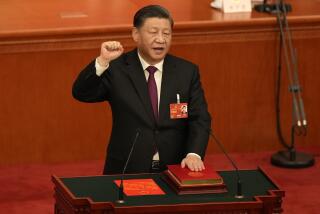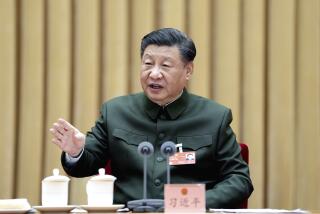China President Tells Leaders of Provinces to Obey Beijing
- Share via
BEIJING — In a major policy statement inspired by Chairman Mao Tse-tung, Chinese President Jiang Zemin has told provincial leaders not to defy Beijing and said stability is fundamental to Communist Party rule.
In his 10,000-word speech issued by the New China News Agency on Sunday, Jiang announced what he called 12 major relationships that China must tackle, apparently trying to eclipse Mao, whose “10 major relationships” address of 1956 was among the most important of his career.
Addressing the closing of the fifth plenum of the 14th party Central Committee on Sept. 28, Jiang said many new problems have cropped up between the central and local governments.
Some localities and departments have paid undue attention to their own interests, failed to implement central government principles and policies and gone so far as to disobey orders and defy prohibitions, Jiang said.
“We will not allow the existence of either local interests or departmental interests that jeopardize the interests of the country as a whole,” he said.
Beijing has repeatedly railed at local officials for defying it, for example by arbitrarily raising prices and easing credit, moves the central government says jeopardize its attempts to rein in inflation.
The toppling of Beijing Communist Party boss Chen Xitong last month was seen by some political analysts as a coup for Jiang and a warning to defiant local powerbrokers.
To accomplish the targets and strategic tasks over the next years, China must seize opportunities, deepen reforms, open up wider to the outside world and promote development and maintain stability, Jiang said.
“Practice has shown that by handling properly the relationship between the reform, development and stability, we will be able to grasp the overall situation and ensure a smooth economic and social development. Otherwise, we will suffer and pay for it,” he said.
He said China is now in a period of economic transition. With “drastic changes” taking place, it is of great and immediate significance to maintain stability, he said.
“Without a stable political and social environment, nothing can be done and it will be difficult to accomplish any plan no matter how good it is.”
Some people are getting rich too quickly, Jiang said.
National income distribution is inclined toward the individual and the share of the state is too small, he said, adding that the income gap between rich and poor is too big.
He ruled out the possibility of allowing lumbering state enterprises to declare bankruptcy en masse.
“Only by ensuring the dominant position of the public sector can we prevent polarization and achieve common prosperity,” Jiang said.
“Any move to shake or give up the dominant position of the public sector will deviate from the direction of socialism.”
More to Read
Sign up for Essential California
The most important California stories and recommendations in your inbox every morning.
You may occasionally receive promotional content from the Los Angeles Times.













